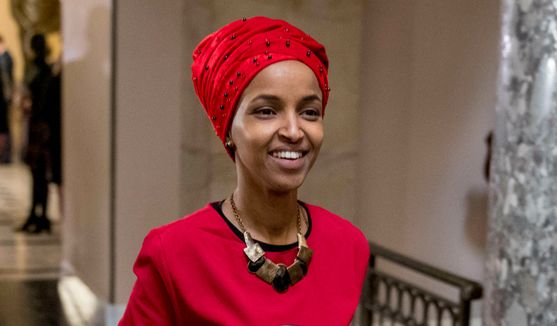
U.S. Rep. Ilhan Omar is back in the news again, and not in a good way. The former state representative who won a seat in Congress last fall continues to be dogged by past missteps, this time eight violations of Minnesota campaign-finance law that will cost her nearly $3,500 in reimbursements and civil penalties.
So complex were the allegations that the state Campaign Finance Board spent nearly a year assessing the case, deposing staff people and former staff people, along with Omar herself. The investigation was broadened in October — just a month before her election to Congress — to look more deeply into the allegations. Board Executive Director Jeff Sigurdson said that between six and eight people were deposed separately.
In an October 2018 editorial, we called on Omar to more fully explain her travel and other expenses. We noted that the allegations “suggest a pattern of carelessness and/or self-dealing with legally restricted funds. Neither conclusion inspires the confidence voters deserve to have in someone they send to the U.S. House to represent them.”
It is even more disturbing, therefore, to learn that among the board’s latest findings was a troubling discovery that is far beyond its jurisdiction, but worthy of greater scrutiny nevertheless. Omar, for two years running, filed joint tax returns with a man she was living with but not legally married to. Complicating matters further, she was legally married to another man at the time.
It’s against the law in Minnesota to file jointly unless one filer is legally married to the other. Last year Omar told the Star Tribune that she had married her partner “in her faith,” and had earlier divorced her first husband “in her faith.” That’s fine for religious purposes. But for tax purposes, only civil marriages qualify. It’s not known whether she benefited materially by filing jointly. That is something that voters, who are obliged to follow tax laws no matter how painful, are entitled to know.
It’s not too much to expect that a lawmaker would check with a tax attorney on a rather complicated marital status before filing. And when questions arise, it’s a violation to use campaign funds to clear up those personal issues, as Omar apparently did. The Campaign Finance Board has ordered that she reimburse her campaign $3,469 for violations related to her tax returns and non-campaign travel costs. She must also pay a $500 civil penalty.
Omar is no stranger to controversy. As a new state House member, she collected $2,500 in speaking fees — $2,000 from Normandale Community College and $500 from Inver Hills Community College — for appearances made shortly after she took office. Rep. Steve Drazkowski, R-Mazeppa, who publicly noted that state law prohibits legislators from collecting such fees from groups that have business before the Legislature, made that public, and Omar returned the money. Drazkowski also filed the latest complaint. “It’s very clear there are huge ethical problems with Rep. Omar,” he told an editorial writer, adding that the House should consider an ethics investigation.
If this pattern continues, further investigation may be necessary. Omar could have avoided nearly every infraction by taking simple measures in advance to determine whether her actions would pass legal muster. In its findings, the board noted that Minnesota “House Research staff did explain that generally when they discuss whether a member can accept something of value, for example, travel and lodging reimbursement … they discuss whether that would violate the gift prohibition,” but do not advise. “Rather, they commonly refer members to the Board. The Omar committee did not contact Board staff … on the appropriateness of using committee funds for the travel reviewed in this investigation.”
Omar’s political rise has been marred by a series of unforced errors, including intemperate remarks and tweets earlier this year that were widely perceived as anti-Semitic. Every month seems to bring a fresh problem.
As an elected representative for Minnesota and one of the first Muslim women and Somali refugees elected to Congress, Omar is helping to break new ground. But more is expected of her than the symbolism attached to her victory. Omar has a special obligation to be worthy of the trust so many have placed in her, including many still-new Americans who expect better.
*story by Star Tribune